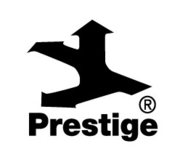Prestige Records
| Prestige Records | |
|---|---|
 | |
| Parent company | Concord Music Group |
| Founded | 1949 |
| Founder | Bob Weinstock |
| Genre | Jazz |
| Country of origin | United States |
| Location | New York City |
| Official website |
concordmusicgroup |
Prestige Records is a jazz record company and label founded in 1949 by Bob Weinstock in New York City.[1] The company recorded hundreds of albums by many of the leading jazz musicians of the day, sometimes issuing them under subsidiaries. In 1971, the company was sold to Fantasy, which was later absorbed by Concord.
History
Weinstock opened a record store for collectors in 1948 while still a teenager. The store was adjacent to the Metropole Jazz Club in New York City. Jazz musicians hung out and rehearsed at the club, and then moved upstairs adjacent to Weinstock's store. Weinstock got the idea to record these jazz stars by offering them cash payments.
Prestige office was located at 446 West 50th Street, New York City.[2] The label's name was initially New Jazz, but changed to Prestige Records the following year. Its catalogue included Gene Ammons, John Coltrane, Miles Davis, Stan Getz, Wardell Gray, Thelonious Monk, and Sonny Rollins.[1]
Weinstock stated a desire for an authentic, spontaneous sound. Unlike Blue Note, Prestige would not pay musicians for rehearsals and discouraged repeated takes. Another Weinstock practice, of rewinding the tapes after "bad" takes, has resulted in very few alternate takes surfacing from the classic Prestige years.
Audio engineer Rudy Van Gelder was in charge of recording many albums in the 1950s. Prestige created new labels in 1960: Swingsville, Moodsville, and Bluesville, with different genres of jazz divided among them.[1]
During this period, Weinstock ceased supervising recording sessions directly, employing Chris Albertson, Ozzie Cadena, Esmond Edwards, Don Schlitten, and producer/music supervisor Bob Porter, among others, to fulfill this function. Musicians recording for the label at this time included Jaki Byard and Booker Ervin, while Prestige remained commercially viable by recording a number of soul jazz artists like Charles Earland. In the mid-sixties the company's headquarters were located at 203 South Washington Avenue in Bergenfield, New Jersey.[3]
Bob Weinstock has been criticized over the years for allegedly exploitive business practices. Jackie McLean in A.B. Spellman's Four Lives in the Bebop Business (1966) is particularly outspoken. Miles Davis, in his autobiography, spoke of the distaste Thelonious Monk had for Weinstock's practices, and mentioned unflattering names such as "the plantation" and "the junkie label" that gained currency among musicians when referring to Prestige. Davis's own feelings were mixed. He resented Weinstock's economic exploitation, but appreciated the chance Weinstock gave him when his career was at its low point.
The company was sold[4] to Fantasy Records in 1971, and original releases on the label formed a significant proportion of its Original Jazz Classics line. Fantasy was purchased by Concord Records in 2005.[4]
In 2017, Concord Music Group revived the Prestige label. The first album released under the label's reactivation was A Social Call from Texas native Jazzmeia Horn.[5][6]
Discography
References
- 1 2 3 Rye, Howard (2002). Kernfeld, Barry, ed. The New Grove Dictionary of Jazz. 3 (2nd ed.). New York: Grove's Dictionaries Inc. p. 324. ISBN 1-56159-284-6.
- ↑ Van Gelder Studio by Ira Gitler
- ↑ Original 1965 liner notes to Blue Seven by Shirley Scott, Prestige PRLP 7376
- 1 2 "The Prestige Legacy". Archived from the original on 24 November 2010. Retrieved 21 March 2010.
- ↑ Nadal, James. "Jazzmeia Horn: A Social Call". allaboutjazz.com. All About Jazz. Retrieved 2017-09-24.
- ↑ Waring, Charles. "HORN OF PLENTY - RISING JAZZ STAR JAZZMEIA HORN TALKS". soulandjazzandfunk.com. Soul And Jazz And Funk. Retrieved 2017-09-24.
External links
- Prestige – official site
- Prestige discography at Discogs
- Prestige discography at JazzDisco
- Prestige Records on the Internet Archive's Great 78 Project